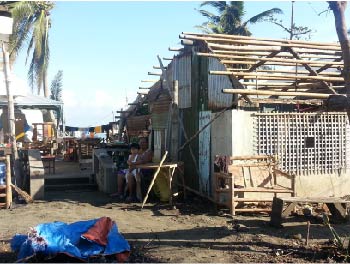14 November 2013
 In parts of Iloilo Province 90 percent of houses are destroyed (c) UN-Habitat
In parts of Iloilo Province 90 percent of houses are destroyed (c) UN-HabitatTwo days after the super typhoon Haiyan hit the Philippines, UN-Habitat as part of the wider UN system in the country deployed two teams on the ground to assess the extent of the damage to housing in collaboration with national and local government.
In response to the devastating typhoon that hit the central Philippines on 8 November 2013, the UN system declared a "Level Three" emergency, making the disaster response a UN wide priority.
Typhoon Haiyan (local name Yolanda) struck the Philippines with sustained winds of 315 kilometres (195 miles) per hour and estimated rainfall of10.0 – 30.0 mm per hour making the super typhoon the strongest storm ever to make landfall in the world. Along the coast of the islands of Leyte and Samar 5-6 meter waves were measured.
UN-Habitat further provided some support to local NGOs to contribute to the assessment in other locations. The city of Tacloban receives most of the media attention given the sheer scale of the disaster – the storm surge destroyed more than 90 percent of the houses of this city of 220,000 (before the disaster) and killed more than one thousand people. UN-Habitat's teams witnessed that destruction of many settlements was on a similar scale. Officially the number of destroyed houses stands at 150,000 but based on extrapolations from previous typhoons and aerial reconnaissance this figure could climb up to well over 500,000.
UN-Habitat has supported the people and government of the Philippines in previous disasters. Based on this experience as well as its deep rooted experience in community driven recovery, reconstruction and rehabilitation throughout the world UN-Habitat is now bringing four international expert staff members to support the Philippines Country Office; in addition local experts are recruited.
UN-Habitat currently focuses on assessments of housing, land and water and sanitation issues and the provision of support to national and international shelter agencies to minimize the mistakes that are too often made after disasters. Temporary shelter options need to be designed in such a way that they facilitate the construction of a core shelter that can incrementally be improved by the people. UN-Habitat is raising funds to support the transition from the emergency to the recovery phase and to build sustainable and resilient human settlements with and for the affected communities.







